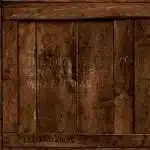
Sadly, the impact of Sadly, the Future Is Not What It Was will probably not be determined until the lonely future arrives to greet us. At three CDs/six vinyl records of drifting scobiform elegies, it’s a massive undertaking. James Leyland Kirby, who sometimes records as the Stranger, is no stranger to these kinds of projects. As the Caretaker, he put out Theoretically Pure Anterograde Amnesia, a six-disc set of dark, atonal cues culled from ancient 78s that was loosely about the failure to situate memories in an ahistorical present. Earlier, his white-noise-fuzzbox eulogy, The Death of Rave, recorded under his sonic-prankster alter-ego V/VM, was initially released for free online in ten massive zip files, each about 100 megs a piece. Additional zip files followed.
In a sense, Sadly, the Future Is Not What It Was is a sequel to both of those gigantic works. It follows Anterograde Amnesia as a study of the impact of the psychic loss of shared memories, particularly those of an encroaching utopic moment, seemingly crushed by postmodernity’s failure to reconcile capitalism’s claims to the End of History. Secondly, it continues on the Caretaker’s reclamation mission to study the loss of past futurisms, part of which being the utopian excitement brought on by rave, the Internet, and sampling technologies.
Yet the loss on the album is not specific. It’s Kirby’s most grave release to date and certainly his most eloquent and gorgeous. Though it’s his first work made without preexisting audio, the prototype has been set in his previous work, as if at least part of his study is deeply and intensely personal. You wonder how it could not be with the emotional depth of the simple, yet plaintive playing of pianos, synths, Theremins, et al. It’s almost a combination of the classical referents of V/VM’s White Death, the sparse sense of isolation in the Stranger’s first album, and the distantiation of the Caretaker’s archival textures. The poetic titles, though, like “Not As She Is Now, But As She Appears in My Dreams”, “A Longing to Be Absorbed for a While Into a Different and Beautiful World”, and “The Sound of Music Vanishing” speak of a romanticism found nowhere else in the man’s truly extensive catalogue.
Some tracks seem to linger too long, but most feel like they don’t belong to time at all. Their lengths are arbitrary. These songs are trapped in the liminal space between the march of hope, the pure light of potentiality, the foggy haze of nostalgia, and the emptiness of a world without any of the aforementioned things. It’s a half-remembered dream, so narrowly out of reach and vaguely out of focus that the effect is overwhelming, even at times, tear-inducing.

